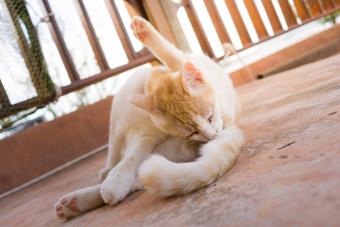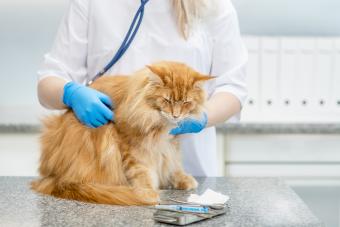
When a cat is bleeding from the rectum, it can frighten owners who first notice it. There could be any number of causes, from an anal sac infection (usually treated with antibiotics) to something more serious.
Rectal Bleeding in Cats
One incident with only a small amount of blood could be from something as simple as straining when going to the bathroom. However, a significant amount of blood can indicate a problem. Cat owners should take the cat to the vet as soon as possible.
- Try to collect a fecal sample to take as well, even if you must take it prior to the actual appointment.
- The vet can test for worms or other problems from this sample.
- Most common issues can be easily treated with medication, but it is usually best not to delay in taking the cat to the vet.
Anal Sac Disease
If your cat begins to bleed from their rectum when they pass stool, they may be suffering from anal sac disease. This happens when the anal sacs become impacted, which can lead to infection and abscesses. A cat will also experience pain when defecating, and bleeding can occur.
- If you notice your cat scooting their rear on the floor, straining to defecate, going outside the litter box, over grooming, or biting their anus, take them to the vet, who will want to do a digital exam of the rectum to check for any abscess swelling, polyps, or tumors.
- The vet can empty the anal sacs, and they may also give antibiotics if they have become infected. Cats that are prone to anal sac impactions do well on a high-fiber diet. If the problem keeps occurring, your veterinarian may recommend routine anal gland expressions or surgical removal of the anal sacs.
Growths on the Rectum and Anus
Two types of growths that can form in the rectal and anal regions are polyps and tumors. Polyps are benign growths that form on the rectum and anus. They are not malignant, but they can cause the cat pain and make it difficult to defecate, which leads to bleeding. Your veterinarian can surgically remove them to relieve the cat's discomfort. Another type of growth found on a cat's anus or rectum is a cancerous tumor. These must be surgically removed, and depending on the severity, your vet may also prescribe chemotherapy.
Constipation
A constipated cat is one that can't properly defecate because their feces has become hard. To learn all about this and other digestive health issues in cats, LoveToKnow's eBook is highly recommended. Written by a veterinarian, it helps you navigate the often overlapping symptoms of digestive issues.
- You will notice your cat using the box to defecate less than normal and straining when they try to.
- Constipation can be due to several causes, which include parasites, impacted anal sacs, or some type of foreign body or growth in the anus or rectum.
- Straining also is a symptom of colitis and disorders of the digestive tract.
- For mild cases, your vet will prescribe a higher fiber diet with some supplements. They may also give you stool softeners to help your cat pass the feces.
- Olive oil can also be a useful addition to their diet in small amounts.

Parasites
Hookworms, tapeworms, and protozoan parasites can lead to a cat bleeding from the anus. A sign of a parasitic infestation is tarry, dark stools, which indicate digested blood, but they may also have red or frank blood on them as well as on the anus.
- Your vet will need to examine a stool sample to diagnose parasites and prescribe medications such as Drontal, Profender, Interceptor, Revolution, Flagyl, or Panacur to remove the parasites depending on the species and severity of the infection.
- Parasites can become a serious problem and affect a cat's immune system leading to worse diseases, so do not delay in bringing your cat to a veterinarian for diagnosis and treatment.
Physical Trauma
Any trauma to the anus will cause bleeding to occur.
- If something is inserted into the rectum, such as a thermometer by your vet, some bleeding can happen.
- Foreign objects from the inside can also cause problems, such as if your cat ate something hard such as bones and the edges are causing trauma in the colon and rectum.
- Your veterinarian will examine the area and may use a colonoscopy to determine the cause. If it's a foreign object, it's possible they can retrieve it with the scope or may recommend surgery to remove it.
- Another type of trauma is bite wounds, which are usually the result of a fight with another cat in the house or an outdoor neighborhood cat.
- Scratches can be caused by the cat itself attempting to ease their discomfort brought on by other conditions such as constipation, polyps, and parasites.
Rectal and Anal Prolapse
This disorder is caused by layers of the cat's rectum moving into the anus. If only the rectal tissue lining is protruding through the rectum, it is called a partial rectal prolapse or anal prolapse. If all layers protrude through the anus, this is a complete rectal prolapse and needs urgent attention.
- Any cat can get rectal prolapse, but it affects Manx cats and kittens the most.
- Common causes for prolapse are disorders of the digestive, urinary, or genital systems, as well as constipation and tumors.
- Your veterinarian will examine your cat to diagnose the condition, but they may also recommend x-rays, ultrasounds, or a biopsy of the protruding tissue.
- The vet will use solutions to bring down the swelling then manually replace the protruding tissue using lubricants and suture the loose areas back into their proper place. This is done under sedation or full anesthesia.
- If the prolapse is due to an underlying condition, they will initiate treatment for that as well, but they generally will work on the prolapse first to relieve the cat's pain and protect the fragile tissues. They will also prescribe pain medication.
Perianal Fistula
This is a disease that affects the area around the cat's anus where open, ulcerated sores form.
- Perianal fistula is very painful, and you will notice your cat straining to defecate.
- Another sign to look out for is your cat licking their anus constantly.
- The disease can be caused by an immune response in cats and your veterinarian will prescribe medications such as tacrolimus, cyclosporine, or corticosteroids. They may also give you an antibiotic ointment or one combining corticosteroids and antibiotics.
- Other causes for fistulas can be any number of conditions affecting the anus and rectum.

Rectal Strictures
A stricture is a constriction due to some type of inflammation, injury, fungal infection, or cancerous tumors. Because the cat's rectum is constricted, it becomes more painful for them to defecate.
- Signs will include diarrhea, constipation, and blood on the anus and on their stool.
- Your veterinarian will use X-rays and a colonoscopy to diagnose your cat.
- The strictures treatment will first involve making your cat more comfortable, which can be done with an enema or stool softeners as well as pain medication and corticosteroids.
- If the cause is an infection or parasites, medication will be prescribed to control that condition. More serious conditions such as cancer will need chemotherapy and possible surgery.
- Your veterinarian may also decide to open the rectal area up with a procedure involving inserting a "balloon" into the rectum and using it to open up the stricture.
Curing Feline Rectal Breeding
While it's upsetting for a cat owner when they see signs of blood on their cat's anus, the treatments are generally successful in mild-to-moderate cases. Because this is indicative of pain for your cat, it's important to get to a vet right away to diagnose their condition and get them some relief for their discomfort.







